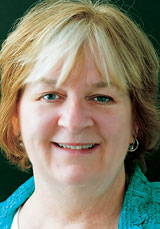Volume 29 · Number 3 · Spring 2012
The dot-matrix revolution
Could a poet ever compose on a computer? A graduate of the creative writing program recalls the days when her early PC seemed suspect.
A while back I watched my students roll into class with their laptops, iPods,cell phones, backpacks and attitudes. Mostly boys building skills in web design, animation or video, they reluctantly chose a seat. Most would rather surf the Web, send a text, listen to music, sketch … anything other than sit through a writing class. They quickly shared the Wi-Fi password and connected to the Internet. As the course progressed, I routinely walked toward the back of the room to make sure the entire class wasn't tuned into YouTube. It felt like a scene from Terry Gilliam's film, Brazil, where as soon as I turned my back all the screens would switch from lecture notes to TV.
As much as I disliked monitoring the students' distractions, a big part of me stood in awe of the technology at their fingertips. Oh, what I would have given, when I was their age, for a slim, light and portable computer.
As an undergrad, I sat in huge lecture halls at the University of Michigan taking notes on paper. I drafted assignments in longhand with favorite pens. To produce the final copy, I pounded the keys of an ancient manual typewriter. There was an art to fixing mistakes, threading the typed page through the roller and lining up to the spot that needed correction.
Before I attended UC Davis, my writing tools evolved to an electric typewriter and then . . . a personal computer! Along with its printer and stack of floppy disks, the machine took up an entire kitchen table.
My professors in the UC Davis creative writing program were not impressed.
Owning one of the first personal computers on campus, I felt the same kind of backlash the first students who owned slide rules must have felt. Teachers were suspicious that using a computer was cheating, that the machine somehow composed the sentences. Writers with fountain pens were honest and diligent and careful with all the nuances, whereas writers with computers were lazy and sloppy and let a program choose and arrange the words.
It didn't help that the printer was a dot-matrix, tap-dancing across the paper to produce a watery, weak font.
I had immense respect for my teachers and wanted them to respect me. They didn't have multimedia projectors, Internet access or colorful presentations splashing across an enormous screen. But their minds were electric and their voices powerful.
Will Baker had a rugged sense of adventure. Sandra Gilbert's passionate discourse could make the most obtuse poetry come to life. Diane Johnson invited us to her home in the hills of Berkeley, where we ate dinner with famous writers. She cooked! Karl Shapiro held class in his living room, with wine and cheese served along with the critique.
I adored everything about Shapiro, from his wild white hair to his impish humor. One night at a party for students and faculty I overheard my professors talking about computers. Aghast, I listened as Karl Shapiro said, "I don't think a poet would ever write on a computer." Then Will Baker said, "You know, it's not the pen. It's not the typewriter. It's not the computer. It's not about the way the word makes its way to the page. It's when the thought hits the mind. That's what counts." Karl Shapiro agreed. "Yes." Yes, that is what writing is about.
I want to give my students all the hope and inspiration my writing teachers gave me. I often shut down all the electronics, to make sure that we are all present in the room, with eye contact and true voices, without the distractions and pleasures of audio-visual gadgets. Nonetheless, I embrace the magic that technology affords. In a twinkling we can peek into the universe of the World Wide Web, where we might find Liberians seeking refuge in Minnesota, teenage goddesses living in Nepal, footballers in Brazil.

Lynda Felder
Lynda Felder, M.A. '85, has been writing digital content professionally for more than 15 years in diverse industries such as medical devices, telecommunications and healthcare. She teaches several college-level writing courses, including Web writing, and she is a volunteer at elementary schools, where she leads storytelling and writing workshops.
